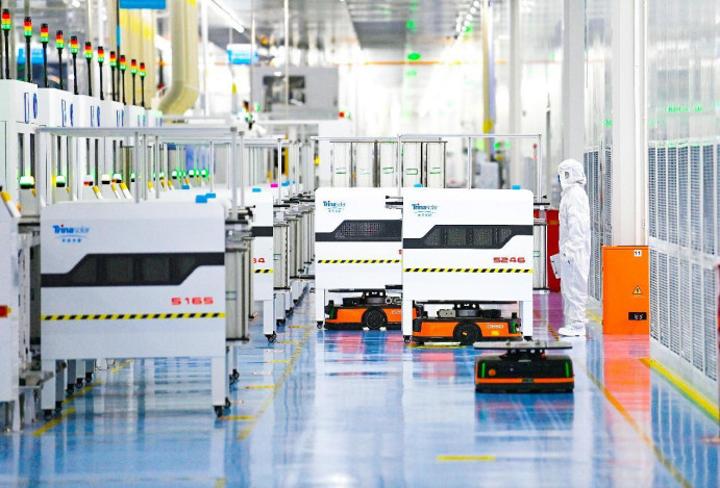Africa-Press – Côte d’Ivoire. Beijing-based autonomous driving startup QCraft recently launched an advanced autopilot solution based on the Journey 5 processor developed by Horizon Robotics, a leader in computing solutions for intelligent vehicles.
The solution, called QCraft Chengfeng, can handle a wide range of complex urban traffic scenarios with higher-level assisted driving capabilities including unprotected left turns, pedestrian and vehicle avoidance, automatic lane changes, automatic turning, traffic light recognition, narrow road and congested roadway passing, and automatic yielding to obstacles.. It makes driving much easier.
Tianfu district in Chengdu, capital of southwest China’s Sichuan province has built a digital twin platform for ecological governance under the assistance from tech firm CloudWalk Technology. The platform includes 18 intelligent gauging stations, five streamgages and 100 sets of surface fire probes. Real-time data are transmitted to the platform via over 200 front-end sensors. The artificial intelligence (AI) platform is able to well manage urban emergencies such as water quality retrievals and pollutions.
China has achieved positive progress in the AI industry in terms of technological innovation, industrial ecology and industrial integration over the recent years, becoming one of the best countries in the world in terms of AI development.
According to the China Academy of Information and Communications Technology (CAICT), the value of the core sectors of the China’s AI industry reached 508 billion yuan ($73.64 billion) last year, up 18 percent year on year.
China ranked first globally in terms of the number of AI-related invention patent applications. The CAICT estimated that Chinese entities submitted 389,000 such applications between 2013 and November 2022, or 53.4 percent of the world’s total, which stood at 729,000; among the 244,000 AI-related invention patents authorized in the world last year, 102,000, or 41.7 percent, came from China.
New progress has been achieved by relevant innovation carriers. A batch of new R&D institutions have made breakthroughs in AI models, AI computing processors and other areas. The country is also in a leading position in the world in terms of computing infrastructure. China has basically built a national integrated big data center system and is accelerating its steps to channel more computing resources from the eastern areas to the less developed western regions. It has established a batch of national open innovation platforms for a new generation AI technologies.
Chinese enterprises have made important breakthroughs in key technologies such as application algorithm, intelligent processors and open source framework. They are also leading the world in image recognition and voice recognition. A number of signature products including intelligent sensors and intelligent connected vehicles have hit the market.
The ecology of the AI industry is taking shape in China. So far, over 400 universities in China have set up AI-related majors and the country ranks second in the world in terms of the number of high-end AI talents. As of the end of 2022, there were 27,255 representative AI enterprises around the world, and 4,227, or 16 percent, were from China.
Three AI industrial clusters have been developed in China, which are in the Yangtze River delta, the Beijing-Tianjin-Hebei region and the Pearl River delta, respectively. The open AI platforms of Baidu, Alibaba, Huawei, Tencent, iFlytek, CloudWalk Technology and JD.com are now able to support the rapid development of the AI industry.
An Hui, deputy chief engineer of China Center for Information Industry Development, told People’s Daily that AI is well integrated with the primary, secondary and tertiary industries and is gradually seeping into the tourism and agriculture sectors. Intelligent finance, healthcare, security and transport have become hotspot scenarios of AI application, and the technology is also making smarter the designing, production, quality inspection and other key links of the manufacturing industry, An said.
An official with the Ministry of Industry and Information Technology noted that China will make more efforts to foster the AI industry and nurture a sound ecology for it during the 14th Five-Year Plan period (2021-2025).
It will build innovation consortiums joined by enterprises of all sizes, universities and research institutes to strive for breakthroughs in key AI technologies and to improve China’s capability in developing smart processors, development framework and typical smart products. China will accelerate the application of AI in manufacturing, transport and energy industries, promote smart upgrading in key areas. The country will also build AI industrial clusters, foster a batch of leading AI enterprises with global competitiveness, and develop a batch of specialized and sophisticated enterprises that produce new and unique products.
Focusing on technological breakthroughs and the expansion of application, attracting global resources with China’s super-scale market, China’s AI industry is deeply integrating into the real economy and becoming a new growth driver. It is estimated that the output of the China’s AI industry will reach a trillion yuan by 2030.
Pour plus d’informations et d’analyses sur la Côte d’Ivoire, suivez Africa-Press






